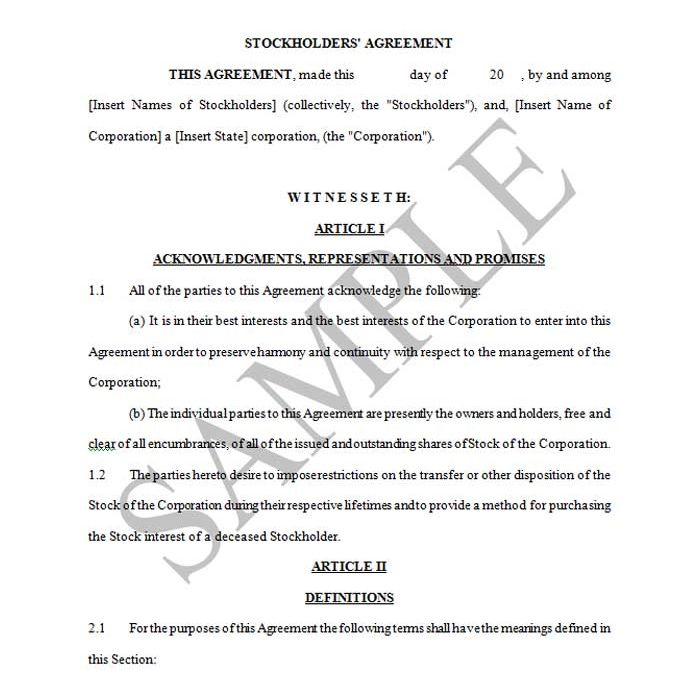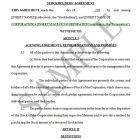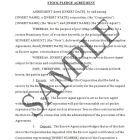Buy-Sell Stockholders' Agreement: Cross-Purchase (17 Pages)
In stock
SKU
CrossPurchaseStockholdersAgreement
$59.00
This is a Cross-Purchase Stockholders’ Agreement between two stockholders and their corporation. The Agreement requires each stockholder to purchase the stock of the other in the corporation in the event of death or disability. There is also a provision requiring a stockholder wishing to sell his or her shares to give the other stockholder a right of first refusal to meet any bona fide offer (Article IV). This Agreement should be distinguished from an entity purchase agreement, where the entity itself, rather than the stockholders, is the purchaser in the event of death or disability.
This is a Cross-Purchase Stockholders’ Agreement between two stockholders and their corporation. The Agreement requires each stockholder to purchase the stock of the other in the corporation in the event of death or disability. There is also a provision requiring a stockholder wishing to sell his or her shares to give the other stockholder a right of first refusal to meet any bona fide offer (Article IV). This Agreement should be distinguished from an entity purchase agreement, where the entity itself, rather than the stockholders, is the purchaser in the event of death or disability.
This Agreement makes both death and disability mandatory purchase and sale events. In some Agreements, purchase is made optional should these events occur. The duration of disability here is twelve months of continuous disability. This can be varied to suit the parties to the Agreement. This Agreement provides for a Certificate of Value to be executed annually to establish the value of the Stock. Other alternatives here may be a formula price or an appraisal. This Agreement calls for the application of any and all insurance coverage to the extent of the purchase price, with the purchaser entitled to retain any excess. This Agreement contemplates the possibility of different purchase prices for the events of death and disability, and includes a longer-term payout of a Promissory Note to complete the disability purchase as opposed to a death purchase. (Article VIII).
Terms of the Agreement provide protection for the possibility of an S election by the corporation. The cross-purchase is generally considered more tax- advantaged than an entity purchase, especially in the case of a C corporation, where life insurance may be involved. The receipt of life insurance proceeds may be an alternative minimum tax preference to a C corporation, while it would not be for an S corporation, a partnership, an LLC taxed as a partnership, or an individual. Moreover, there is a more favorable income tax basis to the purchasing stockholder for his or her remaining interest in the corporation when a cross purchase agreement is used, as the purchased shares increase the purchasing stockholder’s basis – not the case where the entity is the purchaser of the deceased or disabled stockholder’s shares.
Author:
Steven G. Siegel is president of The Siegel Group, a Morristown, New Jersey - based national consulting firm specializing in tax consulting, estate planning and advising family business owners and entrepreneurs. Mr. Siegel holds a BS from Georgetown University, a JD from Harvard Law School and an LLM in Taxation from New York University.
This Agreement makes both death and disability mandatory purchase and sale events. In some Agreements, purchase is made optional should these events occur. The duration of disability here is twelve months of continuous disability. This can be varied to suit the parties to the Agreement. This Agreement provides for a Certificate of Value to be executed annually to establish the value of the Stock. Other alternatives here may be a formula price or an appraisal. This Agreement calls for the application of any and all insurance coverage to the extent of the purchase price, with the purchaser entitled to retain any excess. This Agreement contemplates the possibility of different purchase prices for the events of death and disability, and includes a longer-term payout of a Promissory Note to complete the disability purchase as opposed to a death purchase. (Article VIII).
Terms of the Agreement provide protection for the possibility of an S election by the corporation. The cross-purchase is generally considered more tax- advantaged than an entity purchase, especially in the case of a C corporation, where life insurance may be involved. The receipt of life insurance proceeds may be an alternative minimum tax preference to a C corporation, while it would not be for an S corporation, a partnership, an LLC taxed as a partnership, or an individual. Moreover, there is a more favorable income tax basis to the purchasing stockholder for his or her remaining interest in the corporation when a cross purchase agreement is used, as the purchased shares increase the purchasing stockholder’s basis – not the case where the entity is the purchaser of the deceased or disabled stockholder’s shares.
Author:
Steven G. Siegel is president of The Siegel Group, a Morristown, New Jersey - based national consulting firm specializing in tax consulting, estate planning and advising family business owners and entrepreneurs. Mr. Siegel holds a BS from Georgetown University, a JD from Harvard Law School and an LLM in Taxation from New York University.
He is the author of several books, including: Planning for An Aging Population; Business Entities: Start to Finish; Taxation of Divorce and Separation; Income Taxation of Estates and Trusts, Preparing the Audit-Proof Federal Estate Tax Return, Putting It Together: Planning Estates for $5 million and Less, Family Business Succession Planning, Business Acquisitions: Representing Buyers and Sellers in the Sale of a Business; Dynasty Trusts; Planning with Intentionally-Defective Grantor Trusts; The Federal Gift Tax: A Comprehensive Analysis; Charitable Remainder Trusts, Grantor Trust Planning: QPRTs, GRATs and SCINs, The Estate Planning Course, The Retirement Planning Course, Retirement Distributions: Estate and Tax Planning Strategies; The Estate Administration Course, Tax Strategies for Closely-Held Businesses, and Tort Litigation Settlements: Tax and Financial Issues.
Mr. Siegel has lectured extensively throughout the United States on tax, business and estate planning topics on behalf of numerous organizations, including National Law Foundation, AICPA, CCH, National Tax Institute, National Society of Accountants, and many others. He has served as an adjunct professor of law at Seton Hall and Rutgers University law schools.
The Siegel Group provides consulting services to accountants, attorneys, financial planners and life insurance professionals to assist them with the tax, estate and business planning and compliance issues confronting their clients. Based in Morristown, New Jersey, the Group has provided services throughout the United States. The Siegel Group does not sell any products. It is an entirely fee-based organization. Contact the Siegel Group through its president, Steven G. Siegel, e-mail: [email protected].
We found other products you might like!




